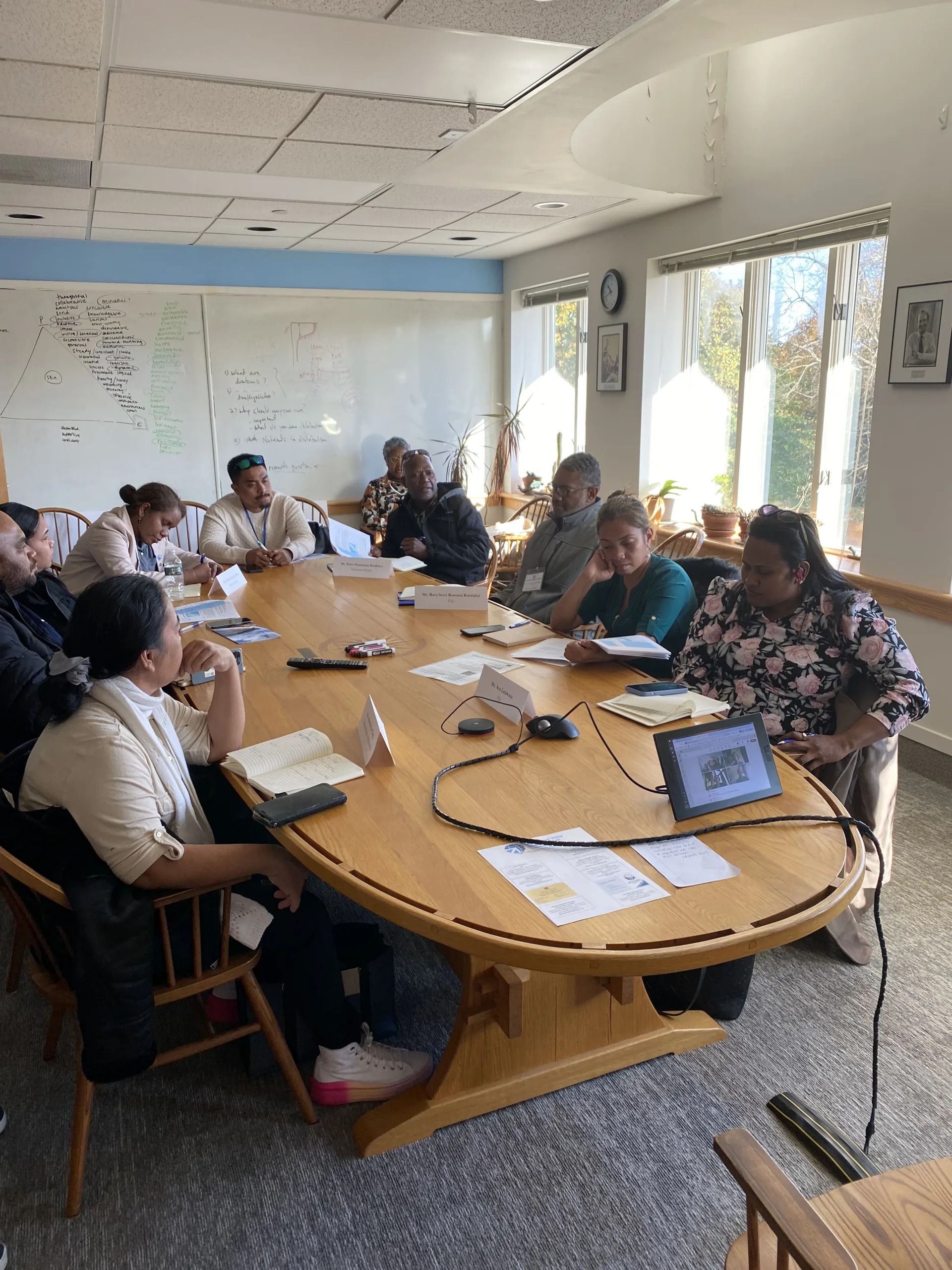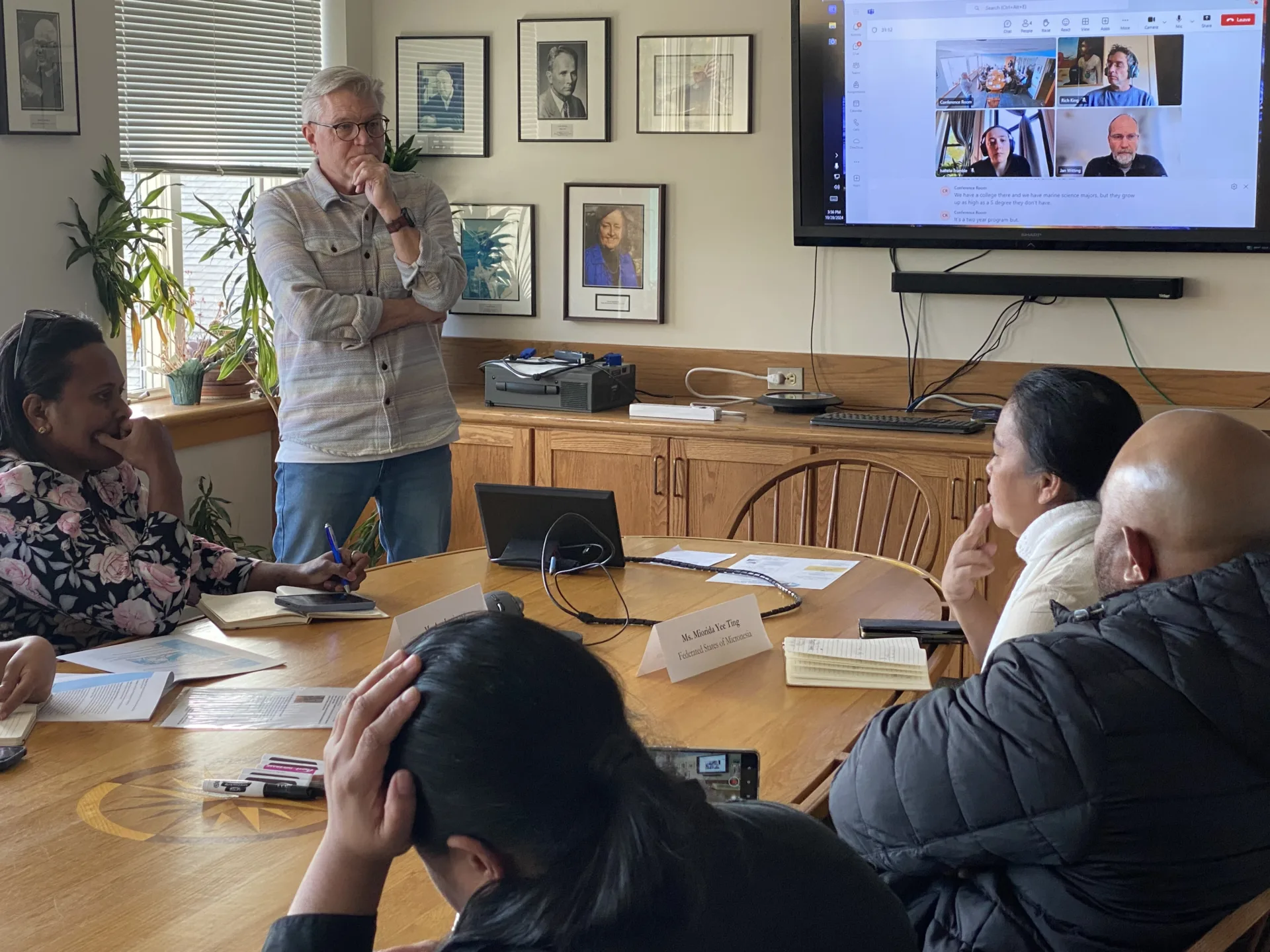News
Sea Education Association Hosts Marine Delegation from the South Pacific

On Monday, October 28, 2024, Sea Education Association (SEA) welcomed a group of ten international participants from the U.S. Department of State’s International Visitor Leadership Program (IVLP) to its campus in Woods Hole, Massachusetts. The meeting provided a unique opportunity for SEA’s faculty and staff to engage with leaders representing seven Pacific Island nations: Micronesia, Fiji, Kiribati, Palau, Papua New Guinea, Samoa, and the Solomon Islands.
The group is part of IVLP’s “Cooperation in Marine Scientific Research” (MSR) initiative, which aims to foster relationships in marine science research, exchange best practices in methods and consent process, explore the relationship between indigenous knowledge and science in the U.S., and encourage collaboration across the Blue Pacific.
The IVLP, as stated by the Bureau of Educational and Cultural Affairs, offers short-term visits to the United States for emerging and established foreign leaders across various fields. These visits are designed to align with the participants’ professional interests and contribute to advancing U.S. foreign policy objectives.
For over 20 years, the Sea Education Association (SEA) has been conducting research, across the South Pacific aboard the SSV Robert C. Seamans, with sampling in the waters of Samoa, Fiji, Kiribati, Tonga, Tahiti, and more recently, Tuvalu, all under official research clearances.
Between 2014-2019, SEA led six voyages to the Phoenix Islands Protected Area (PIPA) of Kiribati as part of the Protecting the Phoenix Islands program. Faculty and students conducted baseline sampling across PIPA and often visited the remote I-Kiribati community on Kanton Island. The scientific data collected was shared with the government of Kiribati to help inform decisions and monitoring of PIPA. During Monday’s discussion, Ms. Joyce Maria Uan, Principal Mineral Officer of the Ministry of Fisheries and Marine Resources Development in Kiribati, spoke with SEA Oceanographer Dr. Jan Witting, who was one of the founding faculty of the PIPA voyages, about future collaboration regardless of the current dissolution of the marine protected area.
In addition, this past summer, SEA’s Coral Reef Conservation: Fiji program worked closely with Fijian communities where students conducted reef surveys and shared data directly with local villages. A Fijian government observer joined the program, helping to make valuable connections during port stops and anchorages. SEA has a long-standing commitment to inviting local observers on board and remains dedicated to continuing this practice. IVLP participants, Mr. Ratu Semi Ramatai Bolalailai, Senior Scientific Officer of the Marine Geology Section at the Mineral Resources Department, and Ms. Anasilini Leniwasa, Foreign Service Officer in the Ministry of Foreign Affairs, expressed excitement about strengthening this collaboration during SEA’s upcoming Coral Reef Conservation: Fiji program in summer 2025.
One delegate inquired about SEA’s data-sharing policy, to which SEA responded that all its oceanographic data is open-access and available upon request. SEA is also working to improve accessibility and organization of its data following the launch of its new website.
Given SEA’s frequent research and partnerships across the Pacific, welcoming the IVLP participants to SEA’s campus was particularly meaningful for faculty that often lead research voyages through the South Pacific. “Relationships like this take many years to build trust and fair exchange,” said Dr. Richard King, who teaches blue humanities at SEA and has co-led multiple trips to the region. “It was a privilege to host them, we’re so grateful for their time, and it meant a lot to hear them suggesting ideas for programs and visits. It’s what we all want at SEA–to share with undergraduates the learning of marine science and humanities in service to local communities, especially those in the Pacific Islands who are on the front lines of the climate crisis.”
While SEA’s ship-based programs often face challenges related to distance, brief port stops, and long-term research conducted outside immediate coastlines, both SEA faculty and IVLP participants recognized SEA’s new coastal community programs as a promising opportunity to expand and deepen collaborative efforts and partnerships. This shared enthusiasm led to a lively exchange of contact information, laying the groundwork for future joint initiatives.
During their visit to Woods Hole, the IVLP participants also engaged with members of the local science community, including representatives from the Woods Hole Oceanographic Institution, the Marine Biological Laboratory, and NOAA. Global partnerships are crucial in addressing today’s most pressing ocean and environmental challenges, and the visit allowed the marine science institutions of Woods Hole to showcase their diverse and innovative work while demonstrating the power of ongoing collaboration within this small but globally influential community.
“SEA was thrilled to welcome representatives from some of our most supportive host countries from the South Pacific; their governments help to promote the sort of ocean research that is vitally important to both local area populations and the world,” said Richard Hopper, President of the Sea Education Association. “Such visits to our home port and the Woods Hole campus help strengthen the partnerships that propel our shared vision and responsible stewardship of a healthy marine environment.”
SEA is eager to integrate the connections made on Monday into existing programs and to develop new initiatives that respond directly to the needs of South Pacific Island communities.
